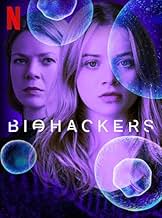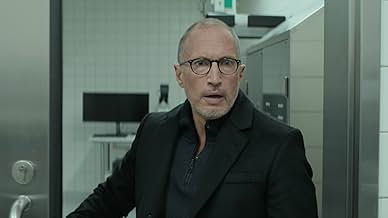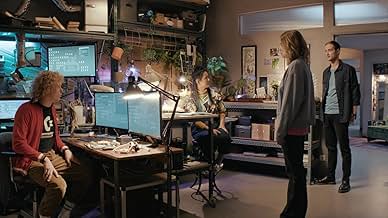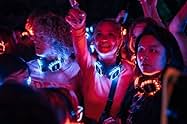A fast-paced thriller following medical student Mia Akerlund who discovers the use of highly advanced biohacking technology in her university town.A fast-paced thriller following medical student Mia Akerlund who discovers the use of highly advanced biohacking technology in her university town.A fast-paced thriller following medical student Mia Akerlund who discovers the use of highly advanced biohacking technology in her university town.
Browse episodes
Featured reviews
Summary
The second season is clearly inferior to the first, since it is more serious, downcast and linear, but it also captures us again by the charisma and fortitude of its protagonist (by Luna Wedler), his conspiracy climate that constantly calls into question the loyalties and behaviors of the characters, some successful suspense scenes, their renewed class notes and what again implies that it takes place in a country with the historical background of Germany.
Review
Contains some information about season 1
The first chapter begins with Mia waking up in a class at the University of Freiburg in a state of confusion: she suffers from an amnesia that prevents her from remembering what happened in the last three months. Her account will describe her attempts to discover the cause of her condition, what is her connection with the event that she had closed the previous season and to reconstruct those three months, while she suffers from some symptoms and signs in principle inexplicable.
The resource of amnesia is always interesting, where those who suffer from it must reconnect with her inner circle and reconstruct her immediate past and assimilate the affective changes that occurred in that period.
Recall that the previous season had ended with Mia betrayed by the journalist Winter and kidnapped in a van with Dr. Lorenz. The young woman does not remember this episode clearly either.
Throughout her investigation and adapting to a changed affective environment, Mia experiences some physical disorders and glimpses of her recent past, the frequency of which makes the use of staging them somewhat repetitive. The situation of Dr. Lorenz, her former nemesis, is also very different.
The comparison with season 1, which was clearly better, is inevitable. Season 2 is more linear, even with all the characters of the previous one it is less choral (his roomates friends are at first almost reduced to a comic relief), it is more serious and does not introduce great conceptual novelties with respect to the first. Mia remains the valued successful experimental subject of the eugenic project Homo Deus, with a highly enhanced immune system. But even the bioethical aspects raised in the previous season lose strength at first, although they reappear at the hands of a powerful character who is revealed as her enemy. Again, the series missed the opportunity to better develop Lorenz's character and her new circumstances.
In any case, the series captures us by the charisma and integrity of its protagonist (by Luna Wedler), its conspiracy climate that constantly calls into question the loyalties and behaviors of the characters, some successful suspense scenes, their renewed notes class and what it implies that it takes place in a country with the historical background of Germany.
The second season is clearly inferior to the first, since it is more serious, downcast and linear, but it also captures us again by the charisma and fortitude of its protagonist (by Luna Wedler), his conspiracy climate that constantly calls into question the loyalties and behaviors of the characters, some successful suspense scenes, their renewed class notes and what again implies that it takes place in a country with the historical background of Germany.
Review
Contains some information about season 1
The first chapter begins with Mia waking up in a class at the University of Freiburg in a state of confusion: she suffers from an amnesia that prevents her from remembering what happened in the last three months. Her account will describe her attempts to discover the cause of her condition, what is her connection with the event that she had closed the previous season and to reconstruct those three months, while she suffers from some symptoms and signs in principle inexplicable.
The resource of amnesia is always interesting, where those who suffer from it must reconnect with her inner circle and reconstruct her immediate past and assimilate the affective changes that occurred in that period.
Recall that the previous season had ended with Mia betrayed by the journalist Winter and kidnapped in a van with Dr. Lorenz. The young woman does not remember this episode clearly either.
Throughout her investigation and adapting to a changed affective environment, Mia experiences some physical disorders and glimpses of her recent past, the frequency of which makes the use of staging them somewhat repetitive. The situation of Dr. Lorenz, her former nemesis, is also very different.
The comparison with season 1, which was clearly better, is inevitable. Season 2 is more linear, even with all the characters of the previous one it is less choral (his roomates friends are at first almost reduced to a comic relief), it is more serious and does not introduce great conceptual novelties with respect to the first. Mia remains the valued successful experimental subject of the eugenic project Homo Deus, with a highly enhanced immune system. But even the bioethical aspects raised in the previous season lose strength at first, although they reappear at the hands of a powerful character who is revealed as her enemy. Again, the series missed the opportunity to better develop Lorenz's character and her new circumstances.
In any case, the series captures us by the charisma and integrity of its protagonist (by Luna Wedler), its conspiracy climate that constantly calls into question the loyalties and behaviors of the characters, some successful suspense scenes, their renewed notes class and what it implies that it takes place in a country with the historical background of Germany.
No, it's not Dark, but it didn't strike me it was trying to be. For one, it's far less serious. There are exactly zero comedic characters in Dark, while this show has three. The science is over the top, but as long as you're not a doctor or a scientist it's possible to suspend reality and just enjoy the story. It's no less implausible than Rain. I thought the main character was quite good. The pace was a little too quick. I think it would have been better spread out over a few more episodes to give more opportunity for the characters to develop, but they did a good job in the 6 episodes they had to work with. American network television can't manage the same level in 12 or 13 episodes most of the time.
I'm at that point where I'm struggling to find something really good to watch I haven't already seen. That happens when you binge watch too much great television, so you find something to hold you over. This did it for an evening. Looking forward to Season 2.
I'm at that point where I'm struggling to find something really good to watch I haven't already seen. That happens when you binge watch too much great television, so you find something to hold you over. This did it for an evening. Looking forward to Season 2.
I was shocked by some of the bad reviews in here, not at all accurate . With the complete lack of anything to watch in covid times I found this really entertaining and enjoyable. Even if there was lots to choose from I would still watch this any day. I do not consider myself an expert critic like many of the people commenting obviously do , just a good show.
Good story if u dont know much about the subject. Characters are not great but the young ones are fresh unused and credible.
The story cant decide if it should be thriller or science but has great pace nothing surprising realy.
Great locations and a surprising carelessness dealing with dna and its possibilities. Cant judge if the science is correct but sounds realistic.
All in all good entertainment but no need for this end.
Not all series need a second one.
German series don't usually grab many headlines, with stodgy plots and dead-serious characters, but this is somewhat better: decent plot, well-acted and, once you get past the sci-fi hokum, pretty engaging.
Film editing is sharp and glossy, with high production values and some good use of flash- backs. It touches on some vitally-important issues in bio-ethics, but it's not going to win prizes for insight and originality.
Worth a watch.
Did you know
- TriviaEpisodes have a total running time of between 40 - 46 minutes, but the end credits run between 9 -10 minutes thus making actual plot times around 30-36 minutes.
- How many seasons does Biohackers have?Powered by Alexa
Details
- Release date
- Country of origin
- Language
- Also known as
- قراصنة الأجساد
- Filming locations
- Freiburg im Breisgau, Baden-Württemberg, Germany(Most of the university scenes are actually filmed at the real University of Freiburg.)
- Production company
- See more company credits at IMDbPro
- Runtime44 minutes
- Color
- Sound mix
- Aspect ratio
- 2.00 : 1
Contribute to this page
Suggest an edit or add missing content
































